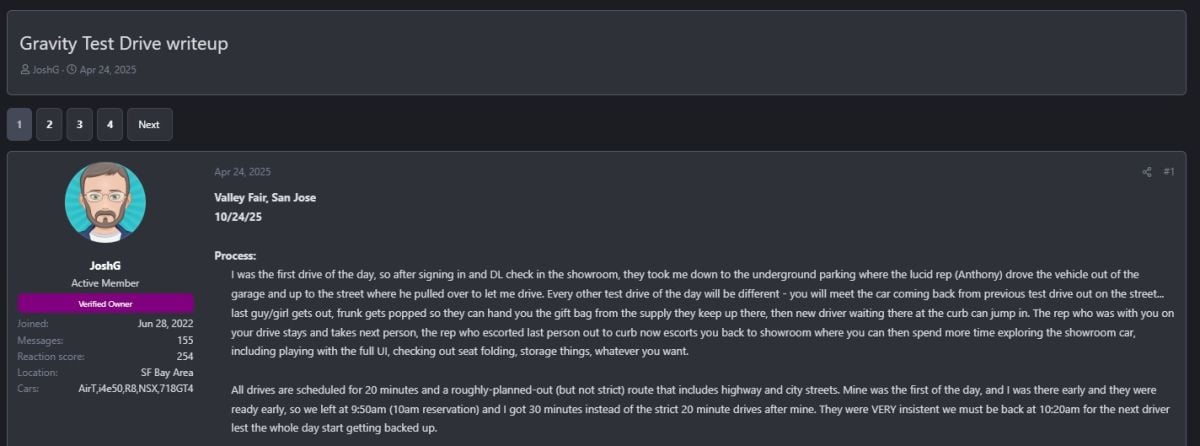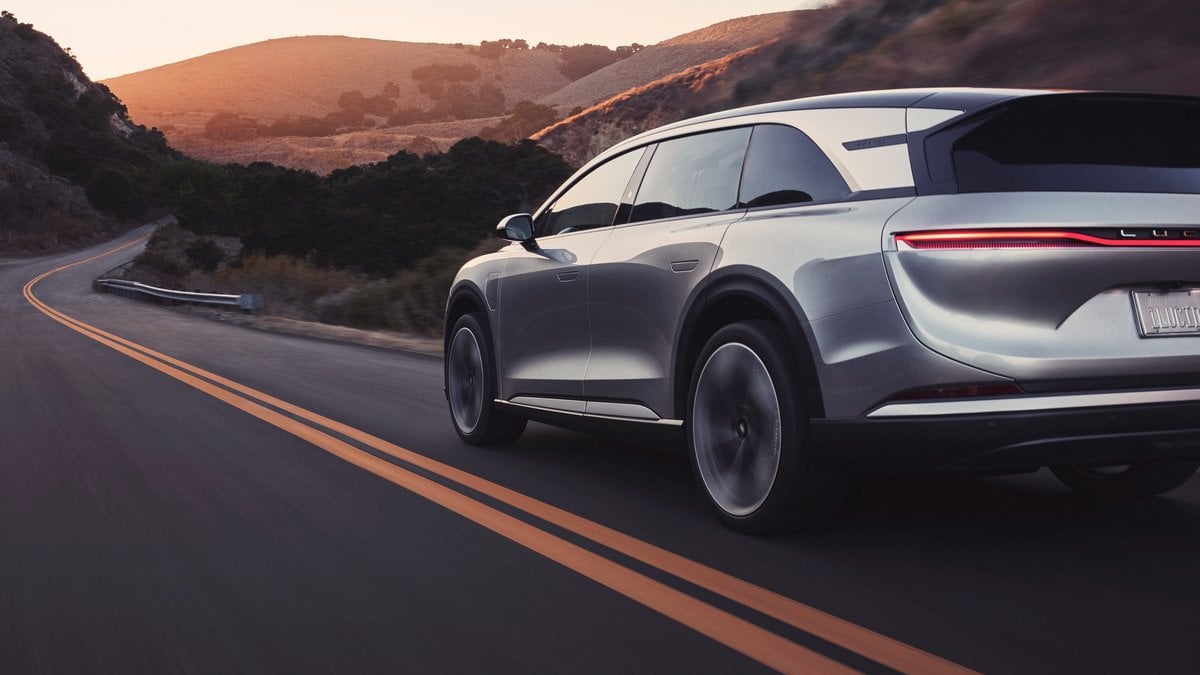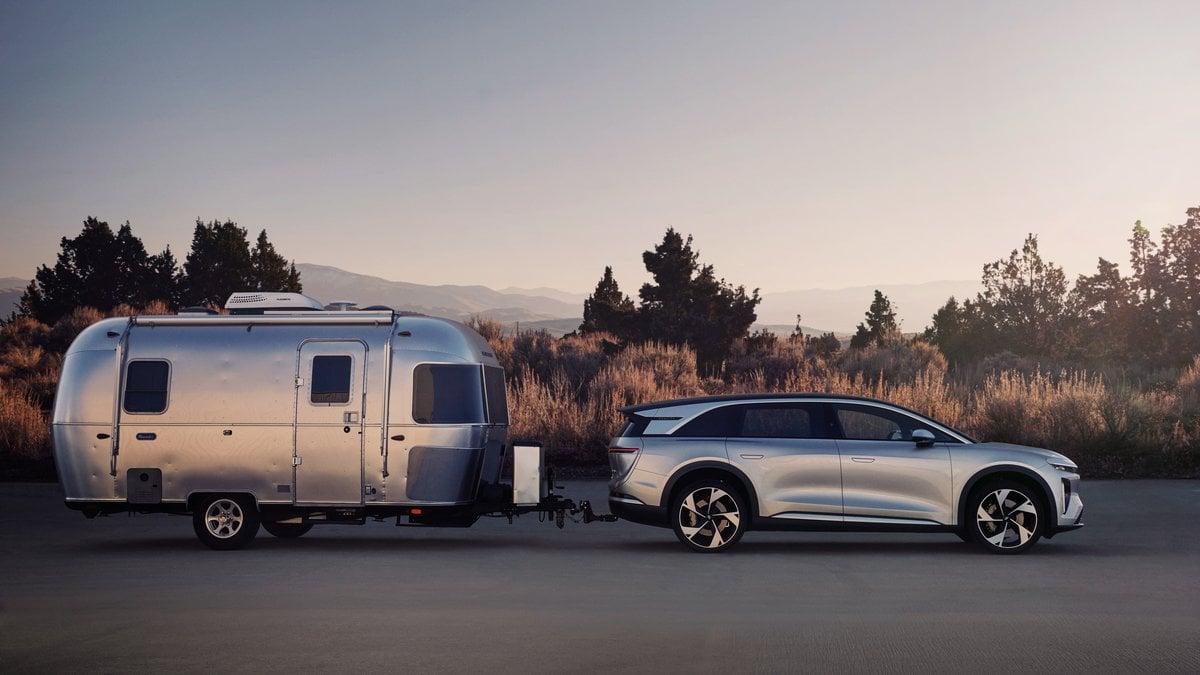It used to be that if you wanted to drive something that turned heads, bent physics, and whispered futurism from its tire treads to its infotainment interface, you looked to Tesla. But that monopoly’s over. Lucid Motors, the upstart boutique automaker born from Tesla alumni and a clean-sheet approach to electric mobility, just rolled its second act onto the stage, the Lucid Gravity.
How The Lucid Gravity SUV Challenges Tesla Model X
It’s not a prototype anymore. It’s a shot across Tesla’s bow, aimed directly at the Model X, and unlike the X, it doesn’t come with doors that imitate seagull cosplay or fit panels that need a prayer circle to align.

When a company chooses to begin its automotive journey with a six-figure luxury sedan, it isn’t entering the market, it’s charging onto the battlefield with a saber in hand. That’s what Lucid did with the Air, and critics, many of whom haven’t written a positive EV sentence in years, were forced to admit it had real legs. The Air made waves not just for its range or power, but for its elegance, its composure, its sheer refusal to be just another appliance. Now comes the Gravity, a vehicle that not only has to measure up to the Air, but carve out an identity in a segment glutted with suburban dreadnoughts.
Lucid Gravity Grand Touring Specs: Performance, Dimensions & Pricing
- The Lucid Gravity Grand Touring delivers up to 828 horsepower and 909 lb-ft of torque, enabling acceleration from 0 to 60 mph in approximately 3.4 seconds. It features a dual-motor all-wheel-drive system and supports fast charging, adding up to 200 miles of range in about 11 minutes.
- This electric SUV measures approximately 198 inches in length, 78.7 inches in width, and 65 inches in height, with a wheelbase of 119 inches. It offers seating for up to seven passengers and provides up to 120 cubic feet of cargo space, depending on the configuration.
- The Lucid Gravity is available in two trims: the Touring, starting at $79,900, and the Grand Touring, starting at $94,900. Fully equipped models can reach up to $125,000, with the Touring model expected to be available in late 2025.
- While the exact top speed hasn't been officially disclosed, the Lucid Gravity's performance specifications suggest it is designed to compete with other high-performance electric SUVs in its class.
Which brings us to JoshG, a verified owner and early test driver who dropped a gem of information on the Lucid Owners Forum:
“I don't think I'll give any insight that hasn't been better described by some of the great YouTube reviews and industry reviewers, but I wanted specifically to compare it to how my Air Touring drove, and I'd say overall driving feel and comfort, road holding, etc., it does feel AT LEAST as good in almost every way to the Air.
Very taught, nicely dampened road feel but still feels connected via wheel and planted to the road.”
Electric SUVs often feel like feature-rich marshmallows; this kind of feedback is no small victory. Gravity isn’t trying to wow you with gimmicks, it’s aiming to drive. And if that means anything to you, you know how rare that is.
Even in edge cases, like rapid left-right flicks designed more to upset stomachs than evaluate chassis dynamics, JoshG noted the Gravity “may give up a little bit of dynamics to the Air,” but not in any way that mattered to real-world drivers.
Lucid Gravity Handling & Software Quirks
Four-wheel steering and the Dynamic Handling Package reportedly give the big SUV a shocking nimbleness, making U-turns and parking lot maneuvers feel less like captaining a barge and more like dancing in hiking boots.
It’s clear Lucid sweated the dynamics here, and that attention pays off in ways you can feel at your fingertips. But let’s not delude ourselves, Lucid is still a new kid in an old game, and the test for every startup is sustainability, not novelty. The Gravity looks production-ready, but its software still carries the scent of beta.
JoshG again:
“Auto-park didn’t work. Tried it 5 times… nothing.”
Another forum user, Bdr100, voiced broader worries:
“How stable is software? I am more worried about minimal system crashes and door locks working properly than if Apple CarPlay or Tidal occasionally act up.”
That’s not nitpicking. That’s the stuff that makes or breaks reputations. People buying $80K+ vehicles expect polished, premium execution, not apologies and firmware updates.
There are more little snags, ergonomic quirks, small cupholders, and an on-screen seat control system that manages to look cool while being less functional than the old-school buttons it replaced.

The Yosemite interior trim got a thumbs-down from JoshG, though he was quick to admit it’s a matter of taste. What’s telling is that none of these were dealbreakers.
The fundamentals, ride, handling, and build quality appear to be rock solid. As JoshG summed it up,
“For ICE drivers and maybe Air Pure drivers, it will feel breathtaking... but for a full-size ‘SUV’, it’s really impressive.”
Lucid isn’t just throwing darts at the EV board hoping to hit a bullseye, they’re crafting cars like artisans in a Silicon Valley lab, hoping each molecule hits its mark. And in choosing to start at the top, they've forced themselves to compete not just with Tesla, but with BMW, Mercedes, and Range Rover.
Lucid Motors History: From Atieva to Luxury EV Innovator
- Established in 2007 as Atieva by Bernard Tse, Sam Weng, and Sheaupyng Lin, the company initially specialized in developing battery packs and electric powertrains for other automakers, including supplying batteries for Formula E race cars.
- In 2016, Atieva rebranded as Lucid Motors, signaling a shift toward producing its own electric vehicles. This move was bolstered by the appointment of Peter Rawlinson, former Tesla Model S chief engineer, who joined as Chief Technology Officer in 2013 and later became CEO in 2019.
- Lucid secured a significant $1 billion investment from Saudi Arabia's Public Investment Fund in 2018, facilitating the development of its manufacturing facility in Casa Grande, Arizona, and the production of its first vehicle, the Lucid Air sedan.
- The Lucid Air, unveiled in 2020, marked the company's entry into the luxury electric vehicle market, offering impressive range and performance. Lucid went public in 2021 through a merger with Churchill Capital Corp IV, trading under the ticker symbol LCID.
They’ve picked the hard road, and that makes every minor flaw feel major. But it also makes every success feel like a rallying cry. This company is trying, and in an industry bloated with badge-engineered mediocrity, that’s refreshing.
We should all want the Gravity to succeed, not just because it’s beautiful or fast, but because it raises the stakes for everyone else. The Model X has grown stale. It needs a real foil, and Lucid may finally be the one to provide it.
Why Lucid Gravity’s Three-Row EV SUV Could Reshape the Luxury Segment
As a three-row electric SUV that actually feels like it was built by people who care, the Gravity’s very existence injects competition and innovation back into a segment that desperately needs it.

And whether you're team Tesla, team Lucid, or team "still driving a V8," that kind of disruption is something we can all root for.
The Gravity might just live up to its name. Not just as another vehicle in Lucid’s growing constellation, but as a center of pull, gravitational, even, on the whole industry.
What do you think about the Lucid Gravity, and how does it compare to the Tesla Model X if you’ve driven it?
Let us know in the comments below.
Image Sources: Lucid Newsroom
Noah Washington is an automotive journalist based in Atlanta, Georgia. He enjoys covering the latest news in the automotive industry and conducting reviews on the latest cars. He has been in the automotive industry since 15 years old and has been featured in prominent automotive news sites. You can reach him on X and LinkedIn for tips and to follow his automotive coverage.






Comments
If you're going to write an…
Permalink
If you're going to write an article based on posts in the Lucid Owner's Forum, why not summarize the discussion there as a whole, rather than just reposting snippets of one person's comments? As someone who hangs out on the forum, allow me:
You can't find a Gravity review that's not incredibly positive. People certainly do pick nits with one thing or another. But as a whole, the press coverage from profession journalists, the YouTube videos from the "influencers", and the individual reports from consumers who have test driven are all glowing. I've yet to see a report without a wrap-up conclusion that's not enthusiastic about the vehicle.
Thanks for your comment and…
Permalink
In reply to If you're going to write an… by Michael (not verified)
Thanks for your comment and great summary man! You're absolutely right the overall feedback on the Gravity has been overwhelmingly positive across the board.